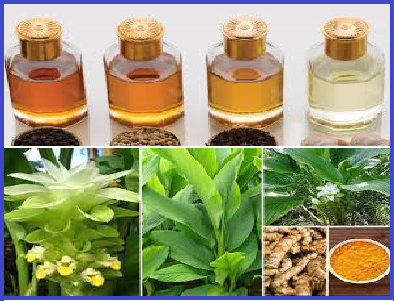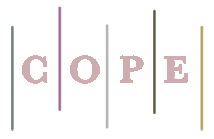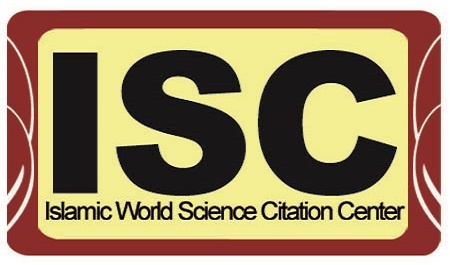Gas chromatography analysis of plant extracts to examine ingredients: Turmeric extracts on Leishmania Promastigotes and anti-Leishmania effect of Ginger
Volume 6, Issue 02, Pages 5-17, Jun 2023 *** Field: Analytical Chemistry in Plant
Abstract
Turmeric extract and aroma oil of Curcuma longa exhibit inhibition properties against various bacteria, parasites, and pathogenic fungi. We investigated the effects of Ginger (Zingiber officinale) and Turmeric extract on Leishmania promastigotes and used gas chromatography-mass spectrometry (GC-MS) for analyzing plant extracts. The hydroalcoholic extractions obtained from the two plants were diluted in 70% ethanol to three different concentrations; 12.5, 100, and 500 mg mL-1. The Leishmania significant strains were propagated in an artificial medium to reach sufficient parasites. The survival percentage of Leishmania promastigotes was affected significantly by the time and concentration of the extracts (P < 0.05). The repeated measures pattern showed an interaction effect between various time points and treatment with the extracts. Statistics analysis showed a significant difference between different concentrations and extract samples (P < 0.05). GC-MS showed that the survival rate of Leishmania promastigotes treated with hydroalcoholic extract of Ginger at 3-time points (24, 48, and 72 hours) was lower than Glucantime and Turmeric extract. The survival rate of promastigotes treated with Turmeric extract was similar to those treated with Glucantime but lower than those treated with a combined extract of Ginger and Turmeric at a concentration of 500 mg mL-1.
References
M. Heinrich, J. Barnes, S. Gibbons and E. M. Williamson, Fundamentals of Pharmacognosy and Phytotherapy, Churchill Livingstone, Edinburgh, 3rd Edition, 2017. https://www.elsevier.com/books/fundamentals-of-pharmacognosy-and-phytotherapy/heinrich/978-0-7020-7008-2
R.D. Altman, K.C. Marcussen, Effects of a ginger extract on knee pain in patients with osteoarthritis, Arthritis Rheum., 44 (2001) 2531-2538. https://doi.org/10.1002/1529-0131(200111)44:11<2531::aid-art433>3.0.co;2-j.
R. Grzanna, L. Lindmark, C.G. Frondoza, Ginger--an herbal medicinal product with broad anti-inflammatory actions, J. Med. Food., 8 (2005)125-132. https://doi.org/10.1089/jmf.2005.8.125.
Y. Shukla M., Singh, Cancer preventive properties of ginger: a brief review, Food Chem. Toxicol., 45 (2007) 683-690. https://doi.org/10.1016/j.fct.2006.11.002.
N. Chaiyakunapruk, N. Kitikannakorn, S. Nathisuwan, K. Leeprakobboon, C. Leelasettagool, The efficacy of ginger for the prevention of postoperative nausea and vomiting: a meta-analysis, Am. J. Obstet. Gynecol., 194 (2006) 95-99. https://doi.org/10.1016/j.ajog.2005.06.046.
P.S. Luize, T.S. Tiuman, L.G. Morello, P.K. Maza, T. Ueda- Nakamura, B.P. Dias Filho, Effects of medicinal plant extracts on growth of Leishmania (L.) amazonensis and Trypanosoma cruzi, Brazil. J. Pharm. Sci., 41 (2005) 85-94. https://doi.org/10.1590/S1516-93322005000100010.
M. Arbabi, M. Delavari, Z.F. Kashan, M. Taghizadeh, H. Hooshyar, Ginger (Zingiber officinale) induces apoptosis in Trichomonas vaginalis in vitro, Int. J. Reprod. Biomed., 14 (2016) 691-698. https://www.ncbi.nlm.nih.gov/pmc/articles/PMC5153574/pdf/ijrb-14-691.pdf
N. Shoaie, P. Mohammadi, S. Roudbar Mohammadi, Antifungal effect of Teucrium polium and Zingiber officinale extracts on clinical isolates of Candida species, Armaghane Danesh J., 17 (2012) 416-422. http://armaghanj.yums.ac.ir/article-1-414-en.html.
F. Feyzi, S. Moradkhani, M. Matini, F. Parandin, A. Roshan, M. Fallah, In vitro Scolicidal effects of methanolic extract of artemisia (Artemisia aucheri) and ginger (Zingiber officinale) on live protoscoleces of hydatid cyst, J. Arak Uni. Med. Sci., 18 (2015) 45-52. http://jams.arakmu.ac.ir/article-1-3756-en.html.
S.D. Jolad, R.C. Lantz, G.J. Chen, R.B. Bates, B.N. Timmermann, Commercially processed dry ginger (Zingiber officinale): composition and effects on LPS-stimulated PGE2 production, J. Photochem., 66 (2005)1614-1635. https://doi.org/10.1016/j.phytochem.2005.05.007.
B. Sasikumar, Genetic resources of Curcuma: diversity, characterization and utilization, Plant Genet. Res., 3(2) (2005)230-251. https://doi.org/10.1079/PGR200574.
J. Sanjay, S. Satyaendra, N. Satish, S. Sumbhate, Recent trends in Curcuma longa Linn, Phcog. Rev., 1(1) (2007) 119-128. https://www.phcogrev.com/sites/default/files/PhcogRev-1-1-119_0.pdf
H.P. Ammon, M.A. Wahl, Pharmacology of Curcuma longa. Planta Med. 57(1) (1991)1-7. https://doi.org/10.1055/s-2006-960004.
A. Goel, K.B. Kunnumakkara, B.B. Aggarwal, Curcumin as ‘‘Curecumin’’: from kitchen to clinic, Biochem. Pharmacol., 75 (2008)787-809. https://doi.org/10.1016/j.bcp.2007.08.016.
L. Cui, J. Miao, L. Cui, Cytotoxic effect of curcumin on malaria parasite Plasmodium falciparum: inhibition of histone acetylation and generation of reactive oxygen species, Antimicrob. Agents Chemother., 51 (2007) 488-494. https://doi.org/10.1128/AAC.01238-06.
R. Das, A. Roy, N. Dutta, H.K. Majumder, Reactive oxygen species and imbalance of calcium homeostasis contributes to curcumin induced programmed cell death in Leishmania donovani, Apoptosis, 13 (2008) 867-882. https://doi.org/10.1007/s10495-008-0224-7.
T. Koide, M. Nose, Y. Ogihara, Y. Yabu, N. Ohta, Leishmanicidal effect of curcumin in vitro, Biol. Pharm. Bull., 25 (2002)131-133. https://doi.org/10.1248/bpb.25.131.
D. Saleheen, S.A. Ali, K. Ashfaq, A.A. Siddiqui, A. Agha, M.M. Yasinzai, Latent activity of curcumin against Leishmaniasis in vitro, Biol. Pharm. Bull., 25 (2002)386-389. https://doi.org/10.1248/bpb.25.386.
M. Nose, T. Koide, Y. Ogihara, Y. Yabu, N. Ohta, Trypanocida effects of curcumin in vitro, Biol. Pharm. Bull., 21(1998),643-645. https://doi.org/10.1248/bpb.21.643.
L. Pérez-Arriaga, M.L. Mendoza-Magana˜, R. Cortés-Zárate, A. CoronaRivera, L. Bobadilla-Morales, R. Troyo-Sanromán, M.A. RamírezHerrera, Cytotoxic effect of curcumin on Giardia lamblia trophozoites, Acta Trop., 98 (2006)152-161. https://doi.org/10.1016/j.actatropica.2006.03.005.
H. B. Rasmussen, S. B. Christensen, L. P. Kvist, A. Karazmi, A simple and efficient separation of the curcumins, the antiprotozoal constituents of Curcuma longa, Planta Medica, 66 (2000) 396–398. https://doi.org/10.1055/s-2000-8533.
M. Akram, A.A. Shahab-Uddin, K.H. A. N. Usmanghani, A.B.D.U.L. Hannan, E. Mohiuddin, M. Asif, Curcuma longa and curcumin: a review article, Rom. J. Biol. Plant. Biol., 55(2) (2010) 65-70. https://tarjomefa.com/wp-content/uploads/2016/11/5685-English.pdf
C.K. Kokate, A.P. Purohit, S.B. Gokhale, Pharmacognosy. 40th edition, Nirali Prakashan, 635 pages, 2007. https://niralibooks.com
M. Haddad, M. Sauvain, E. Deharo, Curcuma as a parasiticidal agent: a review, Planta Medica, 77 (2011) 672–678. https://doi.org/10.1055/s-0030-1250549.
R. K. Bijauliya, S. Alok, D. K. Chanchal, M. Kumar, A comprehensive review on standardization of herbal drugs, Int. J. Pharm. Sci. Res., 8 (2017) 3663-3677. https://www.studocu.com/in/document/tamil-nadu-dr-mgr-medical-university/b-pharmacy/6-vol/44663041
M. Mozafary, M.S. Dayer, A. A. Afshar, H.R. Mollaie, Molecular characterization of Leishmania parasites in naturally infected sand flies from the endemic focus of Kerman City, Southeastern Iran, Asian Pac. J. Trop. Med., 6 (3) (2016)188-192. https://doi.org/10.1016/S2222-1808 (15)61011-8.
R.P. Adams, Identification of essential oils by gas chromatography/mass spectrometry, Carol Stream, Allured Publishing Corporation, 2007. http://www.juniperus.org
M. Sharififard, I. Alizadeh, E. Jahanifard, C. Wang, ME. Azemi, Chemical Composition and Repellency of Origanum vulgare Essential Oil against Cimex lectularius under Laboratory Conditions, J. Arthropod Borne Dis., 12 (2018) 387-397. https://www.ncbi.nlm.nih.gov/pmc/articles/PMC6423461/pdf/JAD-12-387.pdf
A. Montazeri, A. Goshtasebi, M. Vahdaninia, B. Gandek, The short form health survey (SF-36): translation and validation study of the Iranian version, Qual. Life Res., 14 (2005) 875-882. https://doi.org/10.1007/s11136-004-1014-5.
M. Asadi, S. Bahrami, R. Ansari Samani, N. Pakniat, Effect of hydroalcoholic extracts of Stachys lavandulifolia Vahl and Mespilus germanica leaves on Leishmania major, Hormozgan Med. J., 15 (2012) 258-263. https://hmj.hums.ac.ir/Article/88498
M. Barati, I. Sharifi, F. Sharififar, In vitro evaluation of anti-Leishmanial activities of Zataria Multiflora Boiss, Peganum Harmala and Myrtus Communis by colorimetric assay, J. Kerman Uni. Med. Sci., 16 (2010) 32-42. https://jkmu.kmu.ac.ir
L. Shirani-Bidabadi, M. Mahmoudi, S. Saberi, A. Zolfaghari-Baghbaderani, M. Nilforoushzadeh, H. Abdoli, The effectiveness of mix extracts of Thyme, Yarrow and Propolis on Cutaneous Leishmaniasis: a comparative study in animal model (Balb/c), Tehran Uni. Med. J., 66 (2009) 785-790. https://tumj.tums.ac.ir/en
J. Saki, E. Biranvand, R. Arjmand, The in vitro anti-Leishmania Effect of Zingiber officinale extract on promastigotes and amastigotes of Leishmania major and Leishmania tropica, Turk. Parazitol. Derg., 46 (2022) 91-96. https://doi.org/10.4274/tpd.galenos.2021.53825.
M.C. Duarte, G.S. Tavares, D.G. Valadares, D.P. Lage, T.G. Ribeiro, L.M. Lage, Antileishmanial activity and mechanism of action from a purified fraction of Zingiber officinalis Roscoe against Leishmania amazonensis, Exp. Parasitol., 166 (2016) 21-28. https://doi.org/10.1016/j.exppara.2016.03.026.
M. Elamin, E. Al-Olayan, R. Abdel-Gaber, R.S. Yehia, Anti-proliferative and apoptosis induction activities of curcumin on Leishmania major, Rev. Argent Microbiol., 3 (2021) 240-247. https://doi.org/10.1016/j.ram.2020.08.004.
M. Kumar, K. Pal, V. Pratap, J. Kumar Gour, Antileishmanial potential of different extracts of Curcuma longa rhizome against Leishmania donovani, J. Sci. Res., 66 (2022) 129-141. https://doi.org/10.37398/JSR.2022.660114
A.K. Ghosh, F.K. Bhattacharyya, D.K. Ghosh, Leishmania donovani: amastigote inhibition and mode of action of berberine, Exp. Parasitol., 60 (1985) 404-413. https://doi.org/10.1016/0014-4894(85)90047-5.
Y. Rajesh, Y. Nita, K. Murlidhar, Traditional herbal remedies for health care: a review, Int. J. Ayur. Pharm. Res., 2 (2014) 1-14. https://ijapr.in/index.php/ijapr/article/view/220
H. Zadeh-Abbasi Zarandi, L. Shirani-Bidabadi, A. A. Aghaei-Afshar, M. Eghbalian, J. Zolala, S.M. Mirtadjadini, A. Saghafipour, E. Salarkia, In vitro evaluation of hydroalcoholic extracts of Capparis spinosa L., Ricinus communis, and Solanum luteum on Leishmania major (MRHO/IR/75/ER) promastigotes, Jundishapur J. Nat. Pharm. Prod., 17(2) (2022) e115306. https://doi.org/10.5812/jjnpp.115306.
S Golkhah, H Zavvar Mousavi, Removal of Pb (II) and Cu (II) Ions from aqueous solutions by cadmium sulfide Nanoparticles, Int. J. Nanosci. Nanotechnol. 13 (2017) 105-117. https://www.ijnnonline.net/?_action=article&keywords=Mousavi

Copyright (c) 2023 Analytical Methods in Environmental Chemistry Journal

This work is licensed under a Creative Commons Attribution 4.0 International License.
JOURNAL PUBLISHING AGREEMENT
PLEASE PROVIDE US THE FOLLOWING INFORMATION,
Article entitled:
Corresponding author:
To be published in the journal:
Your Status
I am the sole author of the manuscript
- I am an Iranian government employee.
- I am a European government employee
- I am a Asian government
- None of the above
I am one author signing on behalf of all co-authors of the manuscript
- I am an Iranian government employee.
- I am a European government employee
- I am a Asian government
- None of the above
Please tick the above blanks (as appropriate), review the Journal Publishing Agreement, and then sign and date the document in black ink.
Published Journal Article: the author may share a link to the formal publication through the relevant DOI. Additionally theses and dissertations which contain embedded Published Journal Articles as part of the formal submission may be hosted publicly by the awarding institution with a link to the formal publication through the relevant DOI. Any other sharing of Published Journal Articles is by agreement with the publisher only.
Signed: ______________________________________ Name printed: ___________________________________________
Title and Company (if employer representative): _______________________Date: __________________________________














